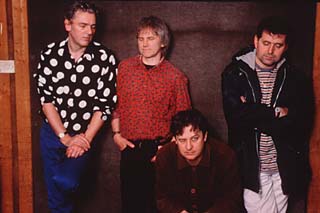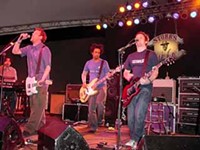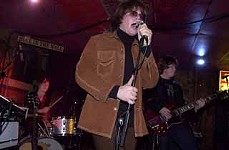Spotlight: Soft Boys
Austin Music Hall, 10pm
By Mindy LaBernz, Fri., March 16, 2001

When the Soft Boys reunited for a few UK gigs in 1994, leader Robyn Hitchcock told an interviewer, "I feel like an old actor squeezing himself into a corset to play Hamlet." As the band prepares for a monthlong tour of the states, Hitchcock, always ready to wring a metaphor until it squeals, restates, "I now feel like an even older actor squeezing myself into a much tighter corset to play Ophelia. It's going to be worth coming along just to watch that."
Although the boys are not really saddled with the pathos and age that Hitchcock's thespian imagery conjures, it's been 20 years since this particular lineup (Hitchcock, guitarist Kimberly Rew, bassist Matthew Seligman, and drummer Morris Windsor) played together. That's excluding, of course, the odd birthday party for really big fans, like, say Robyn's wife Michéle.
"But that wasn't a paid gig," Hitchcock argues. "I think if you want to get really accurate, I think the four of us played at my birthday the following year as well. But again that wasn't a public thing. This is the first time we're letting the folks into our living room and the first time we're charging them any money."
If you know nothing about the Soft Boys and even less about their import, you're not alone. After their debut EP, 1977's Give It to the Soft Boys, the band made its name on two psychedelic folk-rock albums, the slightly difficult A Can of Bees ('79) and the jaggedly poppy Underwater Moonlight ('80). Liner notes from a compilation released by Rykodisc in 1993 posit that "in the mid-to-late Seventies -- when nearly every 'underground'/'alternative' musical group was classified as a 'cult' band -- an argument could be made for the Soft Boys as the last real rock 'cult' band." In other words, few people listened and even fewer got it.
"It wasn't fashionable," says Rew. "The Soft Boys weren't punk and they weren't New Wave and they weren't Old Wave. It was just rock & roll. It was quite tricky to sell. It didn't fit a marketable category. A lot of music tends to be sold on image. Groups like the Police and Elvis Costello, when they came on, were labeled New Wave. And hip, because they were New Wave. The Soft Boys were not hip."
In a modern context, the term "rock & roll" has become a construct, definable relative only to time, place, and personal politics. If one gets all Rock History 101 about it, the late-Seventies version translates to le rock punk. The "rock" to which Rew refers, leans more toward the classic Sixties incarnation, executed by the Soft Boys adeptly, psychedelically, and frenetically.
As Hitchcock recalls in the liner notes to the newly reissued Underwater Moonlight, after a show, "Some bloke came up to me at the bar and said, 'I like your band, but we haven't had a harmony in up here in six months.'" The Soft Boys created, on Underwater Moonlight at least, what sounds to the modern ear like lyrically abstruse, serrated, British pop.
"Probably the easiest way of saying it," explains Hitchcock, "is that we're the missing link between the Beatles and Oasis -- in very crude musical terms, that kind of musical approach. Or, indeed, between the Byrds and REM."
If that's true, then why don't Soft Boys songs show up on UK pop compilations, like the DIY series, on which jewels like "Queen of Eyes," "Kingdom of Love" or "I Wanna Destroy You" would nestle comfortably alongside those by Squeeze, XTC, the Undertones, or Nick Lowe?
"That has to do with commercial success," Rew responds. "We never had any hit records. If you were to look at the weekly program for the Hope and Anchor [in Cambridge] for 1978, you might get: Monday -- Squeeze; Tuesday -- Police; Wednesday -- Dire Straits; and Thursday -- the Soft Boys. And out of those groups, some became hugely successful. But a lot of things have to go right for that to happen."
They didn't, so the Soft Boys closed up shop after releasing Underwater Moonlight.
"I think at the time it felt like, well, it obviously didn't work," reflects Hitchcock. "So, fuck it. But I remember in 1980 thinking it was a bloody good album, and we'd all done really well. And I must have been disappointed, you know, but I can't remember when I woke up and felt disappointed. We knew the climate was against us, even before we started making the album, so I don't think we had any visions to actually sell buckets."
Of course, music history teaches us that the amount of albums sold has little correlation to the amount of influence it has on other artists. In fact, Underwater Moonlight, an album the Trouser Press guide calls "one of New Wave's finest half-dozen albums and unquestionably its most unjustly underrated," is one of those LPs other artists -- as huge as REM, as respected as Yo La Tengo, or as unnoticed as Jason Falkner -- reference and cover.
"That's the beauty of records," Hitchcock says. "The band can be gone, the artist can be gone -- Buddy Holly can be dead in a field -- but the music will carry on indefinitely, as long as there's some form for playing it."
Still alive to enjoy the party ("Touch wood," says Hitchcock), the band is reuniting for a couple of months to celebrate Matador Records' re-release of the seminal album.
"I realized about the middle of last year that it was out of print and had been for about two years," muses Hitchcock. "We didn't even have any old copies lying around from earlier pressings. So it was gone, but people were asking for it. It seemed like a good idea to re-release it."
Although much is being made of the Rew/Hitchcock "reunion" as Soft Boys, the latter insists this is neither a reunion tour nor a retrospective, but merely a celebration of the fact that the album has been, well, celebrated. For his part, Rew attributes the interest in the pairing to its novelty.
"The Soft Boys didn't get as far in their career commercially as actually touring the States," he says. "But even if they had, anybody under the age of about 35 would have been too young to see me and Robyn play together anyway."
In fact, when Rew joined Hitchcock's U.S. tour in 1999, longtime fans started entertaining thoughts that they probably only dared shared in feverish fantasies in the safety of their Internet chat rooms: a Soft Boys reunion. Though his re-integration surprised some folks (Rew was the only original Soft Boy to not rejoin Hitchock in his Eighties band, the Egyptians), he says working with Hitchcock again was a natural progression throughout the Nineties.
"There was a hiccup in '94, and then in, like, '97, I started appearing in encores, and then in '99, I was appearing on his records."
That hiccup -- a miscommunication about scheduling that kept Rew out of the aforementioned "reunion" dates -- may be the cause of whisperings that Rew and Hitchcock had some enmity.
"I never had any animosity with anybody in the group," Rew maintains. "It sounds to me like something someone would say with the benefit of hindsight to kind of retrospectively explain what happened to the Soft Boys."
Rew, who went on to be a successful songwriter as a member of Katrina & the Waves, penning "Walkin' on Sunshine" as well as the Bangles' hit "Going Down to Liverpool," also claims there was no question as to whose songs to use in the Soft Boys.
"It was very much, as you can imagine, Robyn's band," he acknowledges. "It was very much a vehicle for his songs. He was the singer and the writer and the frontman and the, sort of, big personality. It seemed very natural that it was his band to put his songs into reality."
Reality being a relative term, of course. Hitchcock is, after all, the man who wrote "Where Are the Prawns?" and "I Want to Be an Anglepoise Lamp." But to miscast Hitchcock as a purveyor of funny music is to listen with half an ear, or half a heart. Those who've seen his solo shows (or Jonathan Demme's film, Storefront Hitchcock) are familiar with his tangential, interstitial banter -- stories that always originate in a concrete thought, then hopscotch metaphorically until they've morphed into a surreal, fanciful painting. Though Hitchcock claims that old tapes reveal he didn't say much during Soft Boys shows, Rew remembers differently.
"Oh yeah," he laughs. "He's always had a talent for off-the-cuff, rambling introductions to songs, which go off on funny tangents. He's always been able to do that, from even before the Soft Boys, when he'd pop off at the local folk club and sing a song. In fact, he once said to me, 'I always look forward to playing in France, because then I can do my song introductions in French.' And at that point I thought, 'Well that takes the biscuit.'"
What also, er, takes the biscuit, is the fact that the Soft Boys recently recorded a song together for the first time in two decades for a Paul McCartney tribute album. (Hitchcock falls decidedly into the Lennon camp, even covering "Cold Turkey" on Can of Bees.) The track is attributed to Hitchcock, but as the Soft Boys were rehearsing, they played on it. Rew, in his quiet way, says it was good fun.
"Obviously I'm very keen on Robyn and his songs, and I look forward to playing guitar on them and kind of bringing something to it. You know, it's quite a big part of my life."
Despite all understatement and metaphorical sidestepping to the contrary, Hitchcock is happily anticipating the shows as well.
"Don't let this glum exterior fool you," he concludes. "We feel very vindicated, and in our sort of quiet, middle class English way, quite excited." ![]()








